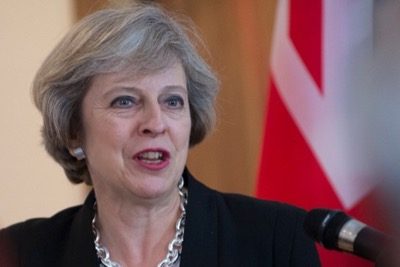Former British Prime Minister May Leads Lockdown Rebellion as UK Struggles Against Second COVID Wave

Former Prime Minister Theresa May has led a backbench rebellion against a second lockdown, demanding the government provide more statistics on the adverse harm the first lockdown had on people’s health. A total of fifty Conservative MPs rebelled against the government bill to impose new restrictions, Theresa being one of 16 who abstained from the vote. Mrs May led criticism of the new measures, stating they would ‘shatter livelihoods’ as she raised concerns as to why parliament had not been getting access to all the data on the consequences of prolonged lockdown.
To see a former leader tear into a current PM the way May did is a rare and memorable event. In fact, not since Sir Edward Heath lambasted Margaret Thatcher in the 1980s have we seen such an overt attack of this nature. The scene however took on a rather comic nature as Johnson, not staying to face May’s tirade, slunk off like a naughty teenager avoiding a telling off from his mother. His departure didn’t go unnoticed in the House of Commons, with ministers muttering in reprehension of his actions.
Mrs May was clearly furious, and did not conceal her severe doubts over the government’s handling of the Covid crisis. Unperturbed by Johnson’s snub, she continued that, having analysed all the SAGE literature, it was clear that a two to three week ‘circuit breaker’ such as the one the government has proposed for the next month, would clearly not be adequate in combating the disease, and such a lockdown would have to be repeated several times. She raised concerns as to how ‘any economy could have borne the damage that would have done’ but moreover how such repeated lockdowns would impact people’s mental and physical health. She said no ‘proper analysis’ had been provided to MPs and that as a result, many were concluding that ‘The figures are used to support the policy rather than the policy supporting the figures’.
Theresa May’s allegations regarding the adverse effect of lockdown are in fact supported by other findings. For example, it was reported this week that there has been an alarming rise of babies deliberately injured or killed during lockdown – around 20% according to Ofsted. Such shocking statistics have been blamed on a ‘toxic mix’ of isolation, poverty and mental illness. Last month a group of high profile doctors wrote to the government, urging them to take deaths and illnesses on a par with Covid-related ones. They believe that the government’s ‘one-track response’ in fact threatens ‘more lives and livelihoods than Covid lives saved’. It is argued that prolonged lockdown, such as we saw earlier this year, created ‘myriad harms, both logged and latent, that need to be balanced with ongoing restrictions and infection control.’ In their letter, the medics cite an increase in cardiovascular deaths, child suicide deaths, and higher rates of anxiety and depression amongst the elderly.
As time goes on and the government attempts to counter this second wave of coronavirus in Britain, it will be under increased pressure to persuade both politicians and the public that its actions are based on sound scientific advice and in the country’s best interests. To an extent, it is clear that Johnson’s government will be damned if it does and damned if it doesn’t. A couple of weeks ago it was accused of dividing the country and ‘treating the north with contempt’ as it put the north of England into higher restrictions than the south under the Tier system, with politicians such as Manchester mayor Andy Burnham calling for a nationwide lockdown together with the financial assistance to furlough staff across the board. Now he is facing criticism for implementing such a lockdown. Even if we cast our minds back to the beginning of the pandemic, back in March this year, Johnson was accused of acting too slowly in his response, and that he should have put in place a full lockdown sooner. But as soon as restrictions were in place, he was condemned by a large body of people shouting about their freedoms and human rights being curtailed.
The reality is that, while there is such disunity in the country, and lack of support and trust in government decision-making, Britain will find it more and more difficult to find a path out of the pandemic. If we compare ourselves to nations such as China and South Korea, where citizens largely abided by the rules and regulations from the beginning of the outbreak, our efforts look pretty pathetic. Britain’s test and trace system, it was said by the Chief Scientific Advisor Sir Patrick Vallance earlier this week, will now have little effect, given how high the number of cases and deaths currently is. Until Brits are prepared to put their individual needs to the side for the sake of a bigger national effort, we will struggle to shrug off this virus.
*
Note to readers: please click the share buttons above or below. Forward this article to your email lists. Crosspost on your blog site, internet forums. etc.
This article was originally published on InfoBrics.
Johanna Ross is a journalist based in Edinburgh, Scotland.

